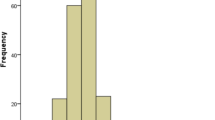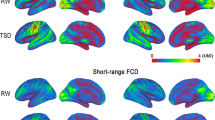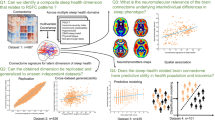Abstract
Subjectively reported sleepiness and objectively measured vigilance are often used to assess and monitor operating performance. Evidence suggests that the response patterns of the two measures are independent of each other. However, the neural mechanism underlying this phenomenon remains unclear. This study aimed to investigate whether subjective sleepiness and objective vigilance were associated with each other. Thirty-three participants were subjected to 34 h of acute sleep deprivation. We collected sleepiness, vigilance, and resting-state fMRI data. We also located the neural mechanism of isolation of object and subject parameters. Firstly, the correlation analysis showed that there was no statistically significant correlation between the changes in vigilance and sleepiness during the sleep deprivation period. Then, implementing the support vector machine algorithm through functional connectivities as features, we found that different functional connectivity patterns underline the isolation of these two factors during sleep deprivation. The functional connectivities involved in characterizing the vulnerability of objective vigilance are more extensive, involving the connectivities within the sensorimotor network, between the subcortical and cortical network, and among multiple cortical networks. The functional connectivity involved in characterizing the vulnerability of subjective sleepiness is limited to the communication between the subcortical thalamus and the somatosensory cortex. In addition, we found that implementing global signal regression would reduce the model’s power to predict vigilance and sleepiness. This work contributes to our understanding of how sleep deprivation affects individual cognition and behavior, and will be of use in the evaluation and prediction of cognitive performance during sleep loss.




Similar content being viewed by others
Data and code available statement
The code is available at https://github.com/WolkeTian/sleep_deprivation_Vigilance. The data is available from the corresponding author upon request.
References
Behzadi Y, Restom K, Liau J, Liu TT (2007) A component based noise correction method (CompCor) for BOLD and perfusion based fMRI. Neuroimage 37(1):90–101. https://doi.org/10.1016/j.neuroimage.2007.04.042
Berka C, Levendowski D, Westbrook P, Davis G, Lumicao M, Olmstead R, Popovic M, Zivkovic V, Ramsey C (2005) EEG quantification of alertness: methods for early identification of individuals most susceptible to sleep deprivation, vol 5797. SPIE. https://doi.org/10.1117/12.597503
Blautzik J, Vetter C, Peres I, Gutyrchik E, Keeser D, Berman A, Kirsch V, Mueller S, Poppel E, Reiser M, Roenneberg T, Meindl T (2013) Classifying fMRI-derived resting-state connectivity patterns according to their daily rhythmicity. Neuroimage 71:298–306. https://doi.org/10.1016/j.neuroimage.2012.08.010
Chandler JF, Arnold RD, Phillips JB, Turnmire AE (2013) Predicting individual differences in response to sleep loss: application of current techniques. Aviat Space Environ Med 84(9):927–937. https://doi.org/10.3357/asem.3581.2013
Chang C-C, Lin C-J (2011) Libsvm. ACM Trans Intell Syst Technol 2(3):1–27. https://doi.org/10.1145/1961189.1961199
Dadi K, Rahim M, Abraham A, Chyzhyk D, Milham M, Thirion B, Varoquaux G (2019) Benchmarking functional connectome-based predictive models for resting-state fMRI. Neuroimage 192:115–134. https://doi.org/10.1016/j.neuroimage.2019.02.062
Diaz BA, Van Der Sluis S, Moens S, Benjamins JS, Migliorati F, Stoffers D, Den Braber A, Poil SS, Hardstone R, Van’t Ent D, Boomsma DI, De Geus E, Mansvelder HD, Van Someren EJ, Linkenkaer-Hansen K (2013) The Amsterdam Resting-State Questionnaire reveals multiple phenotypes of resting-state cognition [Original Research]. Front Hum Neurosci 7(446):446. https://doi.org/10.3389/fnhum.2013.00446
Dinges DF, Pack F, Williams K, Gillen KA, Powell JW, Ott GE, Aptowicz C, Pack AI (1997) Cumulative sleepiness, mood disturbance, and psychomotor vigilance performance decrements during a week of sleep restricted to 4–5 hours per night. Sleep 20(4):267–277. https://doi.org/10.1093/sleep/20.4.267
Gent TC, Bandarabadi M, Herrera CG, Adamantidis AR (2018) Thalamic dual control of sleep and wakefulness. Nat Neurosci 21(7):974–984. https://doi.org/10.1038/s41593-018-0164-7
Goel N, Basner M, Rao H, Dinges DF (2013) Circadian rhythms, sleep deprivation, and human performance. Prog Mol Biol Transl Sci 119:155–190. https://doi.org/10.1016/B978-0-12-396971-2.00007-5
Huang X, Long Z, Lei X (2019) Electrophysiological signatures of the resting-state fMRI global signal: a simultaneous EEG-fMRI study. J Neurosci Methods 311:351–359
Jewett ME, Dijk DJ, Kronauer RE, Dinges DF (1999) Dose-response relationship between sleep duration and human psychomotor vigilance and subjective alertness. Sleep 22(2):171–179. https://doi.org/10.1093/sleep/22.2.171
Krause AJ, Simon EB, Mander BA, Greer SM, Saletin JM, Goldstein-Piekarski AN, Walker MP (2017) The sleep-deprived human brain [Review Article]. Nat Rev Neurosci 18(7):404–418. https://doi.org/10.1038/nrn.2017.55
Leproult R, Colecchia EF, Berardi AM, Stickgold R, Kosslyn SM, Van Cauter E (2003) Individual differences in subjective and objective alertness during sleep deprivation are stable and unrelated. Am J Physiol Regul Integr Comp Physiol 284(2):R280-290. https://doi.org/10.1152/ajpregu.00197.2002
Li X, Morgan PS, Ashburner J, Smith J, Rorden C (2016) The first step for neuroimaging data analysis: DICOM to NIfTI conversion. J Neurosci Methods 264:47–56. https://doi.org/10.1016/j.jneumeth.2016.03.001
Li J, Kong R, Liegeois R, Orban C, Tan Y, Sun N, Holmes AJ, Sabuncu MR, Ge T, Yeo BTT (2019) Global signal regression strengthens association between resting-state functional connectivity and behavior. Neuroimage 196:126–141. https://doi.org/10.1016/j.neuroimage.2019.04.016
Liegeois R, Li J, Kong R, Orban C, Van De Ville D, Ge T, Sabuncu MR, Yeo BTT (2019) Resting brain dynamics at different timescales capture distinct aspects of human behavior. Nat Commun 10(1):2317. https://doi.org/10.1038/s41467-019-10317-7
Milazzo AC, Ng B, Jiang H, Shirer W, Varoquaux G, Poline JB, Thirion B, Greicius MD (2016) Identification of mood-relevant brain connections using a continuous, subject-driven rumination paradigm. Cereb Cortex 26(3):933–942. https://doi.org/10.1093/cercor/bhu255
Murphy K, Birn RM, Handwerker DA, Jones TB, Bandettini PA (2009) The impact of global signal regression on resting state correlations: are anti-correlated networks introduced? Neuroimage 44(3):893–905. https://doi.org/10.1016/j.neuroimage.2008.09.036
Muschelli J, Nebel MB, Caffo BS, Barber AD, Pekar JJ, Mostofsky SH (2014) Reduction of motion-related artifacts in resting state fMRI using aCompCor. Neuroimage 96:22–35. https://doi.org/10.1016/j.neuroimage.2014.03.028
Muto V, Jaspar M, Meyer C, Kusse C, Chellappa SL, Degueldre C, Balteau E, Shaffii-Le Bourdiec A, Luxen A, Middleton B, Archer SN, Phillips C, Collette F, Vandewalle G, Dijk DJ, Maquet P (2016) Local modulation of human brain responses by circadian rhythmicity and sleep debt. Science 353(6300):687–690. https://doi.org/10.1126/science.aad2993
Ng B, Dressler M, Varoquaux G, Poline JB, Greicius M, Thirion B (2014) Transport on Riemannian manifold for functional connectivity-based classification. Med Image Comput Comput Assist Interv 17(Pt 2):405–412. https://doi.org/10.1007/978-3-319-10470-6_51
Nichols T, Hayasaka S (2003) Controlling the familywise error rate in functional neuroimaging: a comparative review. Stat Methods Med Res 12(5):419–446. https://doi.org/10.1191/0962280203sm341ra
Patanaik A, Zagorodnov V, Kwoh CK, Chee MW (2014) Predicting vulnerability to sleep deprivation using diffusion model parameters. J Sleep Res 23(5):576–584
Power JD, Cohen AL, Nelson SM, Wig GS, Barnes KA, Church JA, Vogel AC, Laumann TO, Miezin FM, Schlaggar BL, Petersen SE (2011) Functional network organization of the human brain. Neuron 72(4):665–678. https://doi.org/10.1016/j.neuron.2011.09.006
Power JD, Schlaggar BL, Petersen SE (2015) Recent progress and outstanding issues in motion correction in resting state fMRI. Neuroimage 105:536–551. https://doi.org/10.1016/j.neuroimage.2014.10.044
Power JD, Plitt M, Laumann TO, Martin A (2017) Sources and implications of whole-brain fMRI signals in humans. Neuroimage 146:609–625. https://doi.org/10.1016/j.neuroimage.2016.09.038
Rechtschaffen A, Bergmann BM, Gilliland MA, Bauer K (1999) Effects of method, duration, and sleep stage on rebounds from sleep deprivation in the rat. Sleep 22(1):11–31. https://doi.org/10.1093/sleep/22.1.11
Samann PG, Tully C, Spoormaker VI, Wetter TC, Holsboer F, Wehrle R, Czisch M (2010) Increased sleep pressure reduces resting state functional connectivity [journal article]. MAGMA 23(5–6):375–389. https://doi.org/10.1007/s10334-010-0213-z
Sherman SM (2001) A wake-up call from the thalamus. Nat Neurosci 4(4):344–346. https://doi.org/10.1038/85973
Spasojevic G, Malobabic S, Pilipovic-Spasojevic O, Djukic-Macut N, Malikovic A (2013) Morphology and digitally aided morphometry of the human paracentral lobule. Folia Morphol (warsz) 72(1):10–16. https://doi.org/10.5603/fm.2013.0002
Tkachenko O, Dinges DF (2018) Interindividual variability in neurobehavioral response to sleep loss: a comprehensive review. Neurosci Biobehav Rev 89:29–48. https://doi.org/10.1016/j.neubiorev.2018.03.017
Van Dongen HPA, Dinges DF (2000) Circadian rhythms in fatigue, alertness, and performance. Princ Pract Sleep Med 20:391–399
Van Dongen HP, Baynard MD, Maislin G, Dinges DF (2004) Systematic interindividual differences in neurobehavioral impairment from sleep loss: evidence of trait-like differential vulnerability. Sleep 27(3):423–433
Whitfield-Gabrieli S, Nieto-Castanon A (2012) Conn: a functional connectivity toolbox for correlated and anticorrelated brain networks. Brain Connect 2(3):125–141. https://doi.org/10.1089/brain.2012.0073
Wong CW, Olafsson V, Tal O, Liu TT (2013) The amplitude of the resting-state fMRI global signal is related to EEG vigilance measures. Neuroimage 83:983–990
Acknowledgements
This research was supported by grants from the National Nature Science Foundation of China (31971028).
Funding
National Natural Science Foundation of China (31971028).
Author information
Authors and Affiliations
Contributions
CX conceived and planned the experiments with input from XL. YT and CX carried out the experiment. YT designed and performed the analysis. YT wrote the manuscript with support from CX and XL. XL supervised the project.
Corresponding author
Ethics declarations
Conflict of interest
The authors declared that they have no conflicts of interest in this work.
Additional information
Publisher's Note
Springer Nature remains neutral with regard to jurisdictional claims in published maps and institutional affiliations.
Supplementary Information
Below is the link to the electronic supplementary material.
Rights and permissions
About this article
Cite this article
Tian, Y., Xie, C. & Lei, X. Isolation of subjectively reported sleepiness and objectively measured vigilance during sleep deprivation: a resting-state fMRI study. Cogn Neurodyn 16, 1151–1162 (2022). https://doi.org/10.1007/s11571-021-09772-0
Received:
Revised:
Accepted:
Published:
Issue Date:
DOI: https://doi.org/10.1007/s11571-021-09772-0




